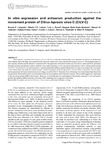Use este identificador para citar ou linkar para este item:
http://www.alice.cnptia.embrapa.br/alice/handle/doc/937928| Título: | In vitro expression and antiserum production against the movement protein of Citrus leprosis virus C (CiLV-C). |
| Autoria: | CALEGARIO, R. F.  LABATE, M. T. V.   PERONI, LUÍS A.   STACH-MACHADO, D. R.   ASTUA, J. de F.   LABATE, C. A.   MACHADO, M. A.   KITAJIMA, E. W.   |
| Afiliação: | RENATA FAIER CALEGARIO, ESALQ; MÔNICA TERESA VENEZIANO LABATE, ESALQ; LUÍS ANTÔNIO PERONI, UNICAMP; DAGMAR RUTH STACH-MACHADO, ESALQ; JULIANA DE FREITAS ASTUA, CNPMF; CARLOS ALBERTO LABATE, ESALQ; MARCOS ANTÔNIO MACHADO, Centro APTA Citros Sylvio Moreira; ELLIOT WATANABE KITAJIMA, ESALQ. |
| Ano de publicação: | 2012 |
| Referência: | Tropical Plant Pathology, n. 2, v. 37, p. 255-265, March-April, 2012. |
| Conteúdo: | Citrus leprosis, caused by Citrus leprosis virus C (CiLV-C), is currently considered the most important viral disease in the Brazilian citrus industry due to the high costs required for the chemical control of its vector, the mite Brevipalpus phoenicis. The pathogen induces a non-systemic infection and the disease is characterized by the appearance of localized lesions on citrus leaves, stems and fruits, premature fruit and leaf drop and dieback of stems. Attempts were made to promote in vitro expression of the putative cell-to-cell movement protein of CiLV-C in Escherichia coli and to produce a specific polyclonal antibody against this protein as a tool to investigate the virus-plantvector relationship. The antibody reacted strongly with the homologous protein expressed in vitro by ELISA, but poorly with the native protein present in leaf lesion extracts from sweet orange caused by CiLV-C. Reactions from old lesions were more intense than those from young lesions. Western blot and in situ immunolocalization assays failed to detect the native protein. These results suggest low expression of the movement protein (MP) in host tissues. Moreover, it is possible that the conformation of the protein expressed in vitro and used to produce the antibody differs from that of the native MP, hindering a full recognition of the latter. Key words: Brevipalpus phoenicis, Cilevirus, Citrus sinensis, polyclonal antibody, serology. |
| Thesagro: | Brevipalpus Phoenicis Citrus Sinensis |
| NAL Thesaurus: | Cilevirus Citrus Citrus leprosis virus C serology |
| Palavras-chave: | Polyclonal antibody |
| ISSN: | 1982-5676 |
| Tipo do material: | Artigo de periódico |
| Acesso: | openAccess |
| Aparece nas coleções: | Artigo em periódico indexado (CNPMF)  |
Arquivos associados a este item:
| Arquivo | Descrição | Tamanho | Formato | |
|---|---|---|---|---|
| invitroexpression.pdf | 1,42 MB | Adobe PDF |  Visualizar/Abrir |









